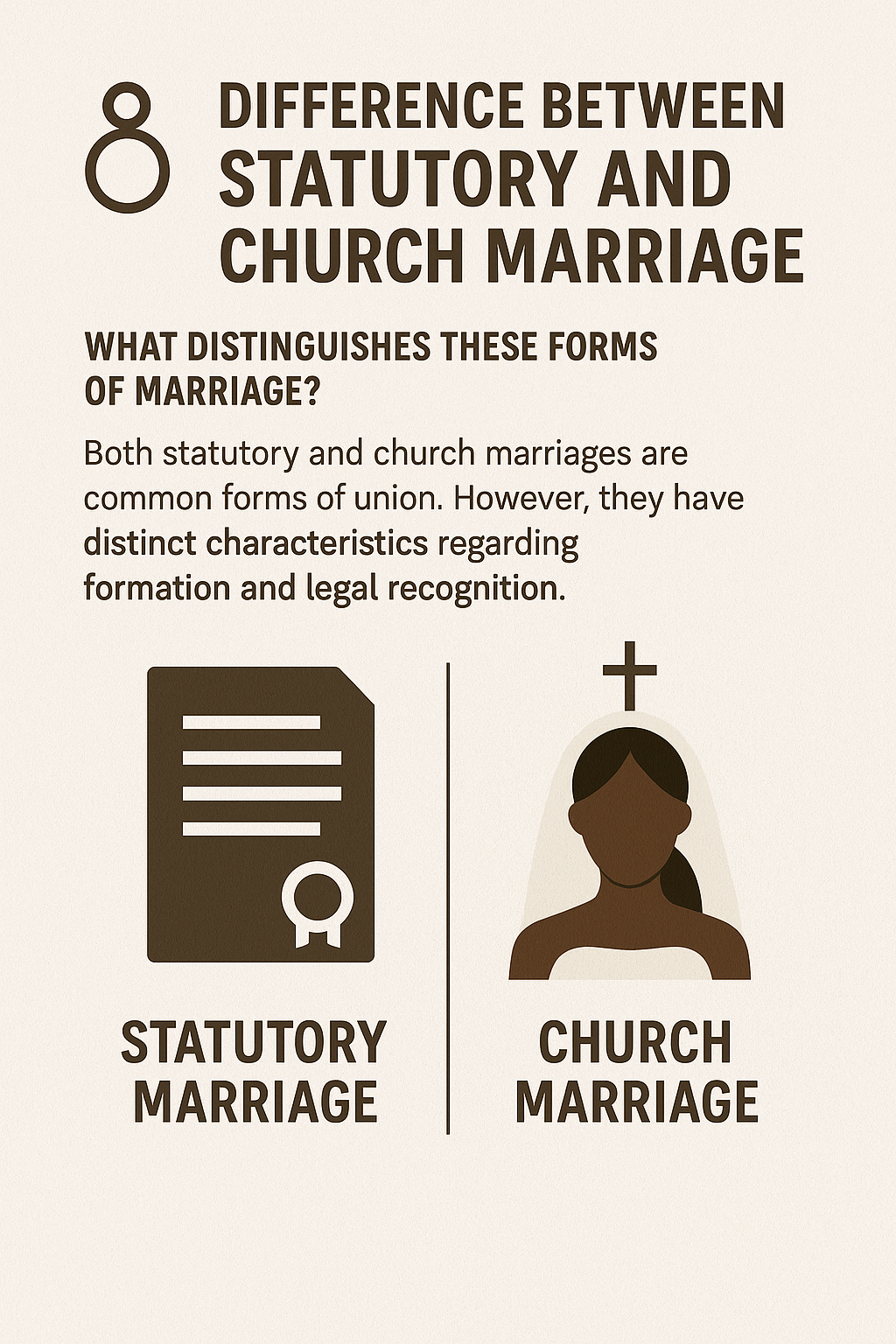In Nigeria, the terms "church marriage" and "statutory marriage" are frequently used interchangeably, leading to widespread confusion about their true legal standing. While a wedding celebrated in a church is a deeply significant event for many, it's crucial to understand that legally, there is no distinct category called "church marriage" in Nigeria. Instead, what is commonly referred to as a "church marriage" is, in fact, a statutory marriage that has been solemnized in a specific, legally authorized setting.
This nuanced distinction is vital for understanding the legal implications, rights, and responsibilities that arise from a marriage in Nigeria.
■ The Legal Anchor: Statutory Marriage
The primary legal framework governing monogamous marriages in Nigeria is the Marriage Act, Cap M6, Laws of the Federation of Nigeria 2004 (and its subsequent revisions). This Act establishes what is known as a Statutory Marriage. Key characteristics of a statutory marriage include:
1. Monogamous Nature: It is strictly a union between one man and one woman. Contracting another marriage while still legally married under the Act constitutes the criminal offense of bigamy.
2. Formal Requirements: It demands specific legal procedures, such as giving notice of intention to marry to a Marriage Registrar, obtaining a Registrar's Certificate, and conducting the ceremony within prescribed hours and conditions.
3. Governing Law: All aspects of its validity, dissolution (under the Matrimonial Causes Act), and legal effects (e.g., inheritance, legitimacy of children) are determined by the Marriage Act and related statutes, not by religious doctrine or custom.
4. Official Documentation: A government-recognized marriage certificate is issued upon solemnization, serving as the official legal proof of the union.
■ Where "Church Marriage" Fits In: A Venue for Statutory Marriage
This is where the clarification becomes critical. A "church marriage" is not a separate form of marriage in the eyes of Nigerian law. Instead, it is one of the recognized venues or modes through which a statutory marriage can be legally contracted.
For a marriage celebrated in a church to be a legally binding statutory marriage, the church in question must be a licensed place of worship by the Minister of Interior. This license grants the religious institution the authority to solemnize marriages in accordance with the provisions of the Marriage Act.
Therefore, when a couple has a "church wedding" in a licensed church, they are, in essence, entering into a statutory marriage. The religious rites and blessings conducted by the church are integral to the ceremony from a spiritual perspective, but the legal validity of the union stems from its compliance with the Marriage Act. The certificate issued by such a licensed church is identical in legal effect to one issued by a Marriage Registry.
■ The Pitfall: Religious Ceremony vs. Legal Marriage
A significant point of confusion arises when a church conducts a religious ceremony or blessing without being licensed to perform statutory marriages, or without the couple having fulfilled the preliminary legal requirements (like obtaining a Registrar's Certificate). In such cases, while the ceremony may be spiritually meaningful to the couple and their congregation, it does not create a legally recognized statutory marriage under Nigerian law.
■ This distinction can have serious consequences regarding:
1. Monogamy: If a man enters into another "marriage" after such a ceremony, he might not be guilty of bigamy if the first ceremony wasn't a valid statutory marriage.
2. Divorce: A couple in such a union cannot seek divorce under the Matrimonial Causes Act, as their "marriage" is not legally recognized under that statute.
3. Inheritance: Spousal rights to inheritance, which are often defined by statutory marriage, might not apply.
4. Children's Legitimacy: While children born within any union are generally considered legitimate, the legal framework for parental rights and responsibilities can be less clear without a recognized statutory marriage.
Conclusion
To reiterate, the Nigerian legal system recognizes statutory marriage as the framework for monogamous unions. What we refer to as a "church marriage" is simply a statutory marriage that has been solemnized in a church that is legally empowered and compliant with the Marriage Act.
For any couple intending to marry in Nigeria, it is paramount to understand this distinction. Ensuring that the chosen church is a licensed place of worship and that all requirements of the Marriage Act are strictly followed is the only way to guarantee that their beautiful church ceremony is also a legally binding and fully recognized statutory marriage in the eyes of Nigerian law. Without this adherence, the union, no matter how elaborate or religiously significant, may lack crucial legal standing, potentially leading to unforeseen complications in the future.



